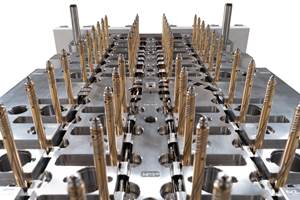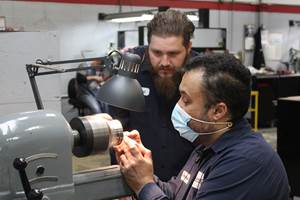Concours Technologies (Formerly Concours Mold Inc.)
This conversation with the Canadian shop offers a snapshot of its operations.
What is Concours Technologies (formerly Concours Mold)’s chief competitive advantage?
Ed Ergun, Corporate Sales: We believe our mold-build process, and the most advanced tooling and machinery, keep us at the top of the industry. We use a home-grown ERP (enterprise resource planning) system and an advanced scheduling system that detail all the processes needed to complete each piece of the mold, from the largest block to the smallest details. This allows us to follow the build process with greater accuracy, as well as realize and maximize our capacity for machining, all while having the flexibility to interrupt our schedule when customers require engineering changes or emergency repairs. Together, these systems give us a breakdown of where a project needs to be at every stage of the build. It’s all color-coded so that, at a glance, everyone can see if we’re on schedule or not. Following this system also helps our customers stay on track to provide all information required to keep the program on schedule. We work a 44-hour work week, which helps keep cost down for us and for our customers. This also means we have additional hours during the week if we need to bring back programs that have had delays.
Regarding tooling and machinery, Concours works with the most advanced available in our industry. We are always on the lookout for the next big breakthrough, and we are willing to test it out and implement it if it means a more streamlined manufacturing process, better quality parts and reduced lead times to our customers.
What are the most significant recent changes in your use of technology?
With the introduction of radio frequency identification (RFID), tool management becomes a much less tedious process, as we gain the ability to preset tools outside of the machine and directly transmit all necessary data to the machine controller. This in turn eliminates any chance for human input error as well as makes for more efficient use of tool life. Having the large pallet pools to accommodate workpieces ranging from small components to 15-ton blocks permits lengths of uninterrupted machining cycles and keeps us reactive to schedule changes with minimal interruption to overall machine run time, all while maintaining higher quality workpieces and reducing overall lead times. At the end of each machining process, the workpiece undergoes a rigorous quality-check procedure, which includes automated Renishaw probing cycles to ensure each surface has been properly produced to the data provided, along with multiple visual and physical checks by the operator. Should any inconsistencies become present, the workpiece then undergoes re-machining—all without being removed from the table to ensure a complete and accurate “first-time quality” setup has taken place. Having true five-axis machining centers like our Promac Sharav GVT with its generously sized table, as well as 3+2 machines at our disposal, provides the extra edge that we need to produce parts that would otherwise be inconceivable with conventional machining processes. Some of our newest additions include DMG 80 and 210 machining centers, as well as large-capacity MCC-VG finishing machines that provide us with the speed and accuracy we need without sacrificing the quality of our parts. With recent advancements on the EDM side of the industry, our electrode sinking capabilities have greatly increased in speed, accuracy and overall surface finish, thanks to our Ingersoll Eagle 800 and its built-in adaptive current-shape technology, which allows for higher stock-removal rates and drastically reduced electrode wear.
How has Concours’ general approach to business changed in recent years, and what’s driving this?
We are doing everything we can to optimize what we do, including improving our processes, employee training and education. We encourage our employees to offer new ideas for improvement. Three months from now, I could be changing how we do something just because someone had a great idea or suggested a new approach.
Where do you see Concours in the next three to five years in terms of technology, business strategies, place in the market and so on?
Technology in the industry seems to be advancing more rapidly, and the speed and accuracy of the equipment is mind-boggling. We will continue buying the best and replacing anything outdated. We recently purchased two new Unisig multitasking machining stations (USC-M50 and USC-M38) that replaced several older pieces of equipment. These Unisigs allows us to complete boring-mill work, gundrilling and CNC cutting, all within the same setup. Minimal setups save time and cost, and ensure better accuracy, which translates into better pricing and timing for our customers.
Related Content
MMT Chats: The Connection Between Additive Manufacturing Education and ROI
This MMT Chat continues the conversation with Action Mold and Machining, as two members of the Additive Manufacturing team dig a little deeper into AM education, AM’s return on investment and the facility and equipment requirements to implement AM properly.
Read MoreConfronting the Mold Design Talent Drought
Recently, I reposted on LinkedIn the results of an informal survey we conducted, which revealed a shortage of skilled mold designers. It quickly gained a lot of traction. Given the response, I thought I'd summarize the feedback and keep the conversation going.
Read MoreHow to Solve Hot Runner Challenges When Molding with Bioresins
A review of the considerations and adaptations required to design hot runners and implement highly productive injection molding operations.
Read MoreQuestions and Considerations Before Sending Your Mold Out for Service
Communication is essential for proper polishing, hot runner manifold cleaning, mold repair, laser engraving and laser welding services.
Read MoreRead Next
Reasons to Use Fiber Lasers for Mold Cleaning
Fiber lasers offer a simplicity, speed, control and portability, minimizing mold cleaning risks.
Read MoreAre You a Moldmaker Considering 3D Printing? Consider the 3D Printing Workshop at NPE2024
Presentations will cover 3D printing for mold tooling, material innovation, product development, bridge production and full-scale, high-volume additive manufacturing.
Read MoreHow to Use Continuing Education to Remain Competitive in Moldmaking
Continued training helps moldmakers make tooling decisions and properly use the latest cutting tool to efficiently machine high-quality molds.
Read More




















